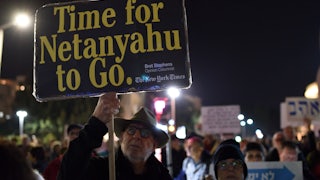Hamas’s massacre of 1,200 Israeli civilians, in addition to being the greatest humanitarian outrage ever visited on the state of Israel, is also an act of both rehabilitation and self-erasure. Overnight, Hamas reestablished the legitimacy of the Israeli government, which had been hanging by a thread under an authoritarian prime minister, Benjamin Netanyahu, currently on trial for corruption by a judiciary whose independence he’s trying to destroy. Hamas also allied itself with its own gravediggers by guaranteeing a furious military response, which has already begun, in which Israel will endeavor to remove every trace of the terrorist group from Gaza. The Hamas incursion, which (according to The Wall Street Journal) was plotted in collaboration with Iran, was not just obscene; it will also, I think, enter the history books as one of history’s greatest tactical blunders.
This was by any definition an atrocity: Hamas gunmen struck 20 sites near the Gaza Strip, murdering adults and children indiscriminately. They opened fire on unarmed kibbutzim. They opened fire on a music festival. They shot people in their cars, in their houses, and in the street. Seven people were shot while waiting for a bus. One gunman filmed himself shooting an elderly woman, using her cell phone, then posted the video to Facebook and set her house on fire. This wasn’t a military operation; it was a Jew-killing spree. The gunmen also took more than 100 civilian hostages. These actions are all, unambiguously, war crimes.
The next victims will be the people whose interests Hamas purports to defend. It would be pointless to expect Israel not to move swiftly into Gaza to smash Hamas. Any nation would do the same, as a simple matter of self-defense.
Israel’s hands are not clean going into Gaza. It is no longer controversial to describe Israel’s policies toward Palestinians in Gaza and the West Bank as a form of apartheid. Israel’s 15-year blockade of Gaza, according to Amnesty International, “amounts to illegal collective punishment.” Plenty of civilians, including children, have died at the hands of Israeli soldiers in Gaza, under conditions some human rights groups consider war crimes. Many more will die in the days to come. There’s plenty of blame to go around.
But it’s worth noting one key moral difference. Israel, at the very least, consistently denies that it targets civilians deliberately. Hamas has never pretended to consider civilian targets illegitimate. Hamas will surely keep its promise to retaliate against Israeli bombings and the imminent Israeli invasion by killing many, if not all of, its Israeli hostages. That’s repugnant.
It’s also just stupid. What were Hamas’s (and, if The Wall Street Journal’s reporting holds up, Iran’s) war aims? Peter Krause, a political scientist at Boston College, told The Washington Post’s Marc Fisher that Hamas’s goal was to terrorize Israel, provoke a disproportionate reaction, and thereby scuttle the official normalization of relations between Israel and Saudi Arabia.
The first two parts of this game plan resemble what Al Qaeda envisioned on 9/11. The attacks on the World Trade Center and the Pentagon, and the slaughter of 2,977 civilians, did indeed terrorize the United States and prompt a disproportionate—and, for Al Qaeda, ruinous—military response. The U.S. ended up lingering in Afghanistan nearly 20 years after Al Qaeda was defeated at Tora Bora (largely, it turned out, by Afghan troops). The U.S. also ended up waging, for no apparent reason, an eight-year war against Iraq. This was all somewhat traumatic for the U.S., but it never advanced, by so much as an inch, Al Qaeda’s stated goal of eliminating Western influence over the Islamic world.
It’s inevitable that Israel’s response to terror, much like that of the U.S. after 9/11, will be disproportionate. But as was true for Al Qaeda and the U.S., the resultant harm will be far greater to Hamas than to Israel. And while Israel will likely be condemned internationally for the collateral damage it inflicts on Palestinians as it roots out Hamas, the jury’s still out on whether that will outweigh international outrage over Hamas’s Manson Family–like tactics.
I would guess not. Certainly it won’t likely change the equation for Saudi Arabia, whose Crown Prince Muhammed bin Salman has amply demonstrated his indifference to bloodshed. Saudi Arabia “stands by the Palestinian people,” he said after the Hamas raid. Don’t bet on it.
Hamas may have delayed the Saudis’ recognition of Israel, but Saudi Arabia has been an unofficial ally of Israel for years, much as the United Arab Emirates, Bahrain, Morocco, and Sudan were well before the Trump administration formalized matters with the Abraham Accords. (Let’s face it: If the Abraham Accords were difficult to pull off, do you really think the job could have been done by President Donald Trump’s son-in-law?) As Imad K. Harb, director of research and analysis at the Doha-based Arab Center, wrote last May for Al-Jazeera, “Palestine today appears like an afterthought in the Arab political order.”
Hamas’s weak tactical reasoning is not atypical for terror groups. Terrorists almost never get what they want. The Irish Republican Army did not chase Britain out of Northern Ireland. The Baader-Meinhof Gang did not subsume West Germany into the Communist East Germany. The Proud Boys did not overturn the 2020 election. The only straight-up terrorist victory I can call to mind is Gavrilo Princip’s assassination of Archduke Franz Ferdinand, which in 1914 provoked a world war that led to the dissolution of Austro-Hungary, thereby freeing his beloved Bosnia from that empire. But even here, Princip’s ultimate aim went unrealized. It would take the better part of a century—and bloodshed galore—before Bosnia and Herzegovina became an independent state.
The only palpable long-term danger to Israel arising from Hamas’s invasion is that Netanyahu will tighten his grip on power, just as President George W. Bush did after 9/11. Indeed, that’s happened already; on Wednesday Netanyahu formed a national unity government with members of the opposition, though at this point it’s only for the duration of the war.
My guess is it won’t be a long war. When it’s done, Israel will, one hopes, hold Netanyahu’s government accountable for failing to anticipate the attack, much as Golda Meir was made to resign in 1974 over her failure to anticipate the Yom Kippur War. If Representative Michael McCaul, Republican chair of the House Foreign Affairs Committee, is correct in his assertion that Egypt warned Israel three days before the attack, that may make removing Netanyahu easier. Bush’s political rebirth after 9/11 eventually cost the U.S. lost prestige abroad, but it didn’t threaten the legitimacy of the U.S. government. But with Netanyahu, the situation is quite different.
Fortunately, there are voices in Israel saying already that Netanyahu must lose his job over the Hamas invasion, including the left-leaning Haaretz, which on Sunday editorialized that “the disaster that befell Israel on the holiday of Simchat Torah is the clear responsibility of one person: Benjamin Netanyahu.” (I’m grateful to The Nation’s Jeet Heer for flagging it.) Maybe this can help: “Those who want to thwart the establishment of a Palestinian state should support the strengthening of Hamas, and the transfer of money to Hamas,” Netanyahu said in March 2019. “This is part of our strategy, to differentiate between the Palestinians in Gaza and the Palestinians in Judea and Samaria [i.e., the West Bank].” Whoops.
Ironically, the first part of Netanyahu’s strategic assessment may have been correct. Hamas’s existence probably was an obstacle to the creation of a Palestinian state. If that’s true, chasing Hamas out of Gaza might make it possible once again to contemplate a two-state solution. Granted, many practical obstacles would remain. In any event, it’s doubtful that Hamas’s tactical goal was ever to bring about its own destruction. Even if it survives, Hamas has by its own deeds shed any hope of acquiring anything that resembles political legitimacy; the path to some Sinn Féin–like rebirth is permanently closed off. Events of the past week have established for all time that Hamas is nothing but a pack of cold-blooded killers. Let’s try not to forget that in the weeks to come.






